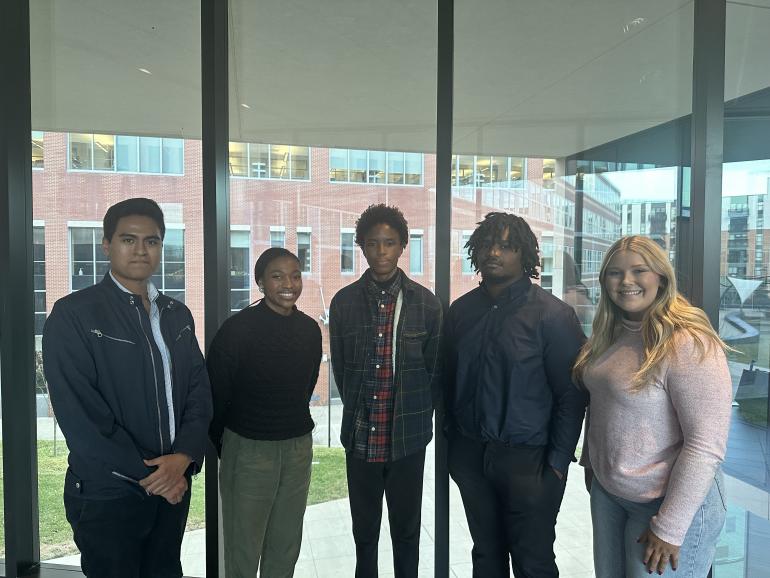SPARK Announces 2024 Cohort of Undergrad Health Equity Researchers

The 2024 SPARK cohort, from left to right, includes Eduardo Soria Chiroque, Mandy Dickerson, Botshelo Angoma, Keyoncee Washington, Darnell Randle II, and Lily Kate Hubbs. Photo provided by SPARK.
LEXINGTON, Ky. (Feb. 6, 2024) – The University of Kentucky SPARK (Students Participating as Ambassadors for Research in Kentucky) Program has named its 2024 cohort.
Now in its fifth year, the SPARK program allows undergraduate students from underrepresented backgrounds and communities to get a jumpstart in health equity research early in their college experience. The program has grown to include undergraduates from Kentucky State University (KYSU) in addition to UK students; a total of 17 students have been supported by SPARK so far.
Students interested in joining the program go through a rigorous application process. Accepted students, called SPARKlers, complete a semester-long health equity research course. They learn how to develop and implement a health equity research study, operate a budget, adhere to human subjects research protections and research integrity standards, and collaborate with community members.
SPARKlers then work with program leaders and mentors to develop a research project they can conduct over the summer. A key element of SPARK is that the students are compensated for their research work. While hands-on experience and building their CV is important for future academic and employment prospects, many students can't afford to skip a summer of earning a wage. SPARKlers therefore receive a generous stipend to conduct their summer project, which helps make participating in the program accessible to students of all backgrounds.
After implementing their research project, SPARKlers undertake data analysis, write up their findings, and present/publish their research in professional settings. They conclude their participation in the program by presenting their research findings at the annual spring conference of the UK Center for Clinical and Translational Science.
In addition to research training, students receive professional development opportunities to support their futures in equity-related careers and graduate studies. These activities include a health equity book club; seminars on mentor-mentee relationships, academic belonging, and physician-scientist careers; and experiential research exposures to sites across Kentucky
New SPARK participant Eduardo Soria, a sophomore at UK, applied to the program because of his passion for health equity. He says he was shaped by his childhood in an underserved community in Peru, where his mother was a physician who opened a health clinic. He’s now a pre-med biology major and pursuing his interest in biomedical informatics while working in the lab of Hunter Moseley, PhD, co-director of biomedical informatics in the UK Center for Clinical and Translational Science. Soria plans to become a physician-scientist, committed to working towards better health for the most vulnerable. For his SPARK project, he intends to focus on the health of Hispanic and Latino residents of Appalachia.
“I wanted to join SPARK because I thought it would be a life-changing experience, being in a program where I can focus on my own research for a year and a half, and helping my own community. That’s invaluable. It’s a high-impact learning opportunity,” he said. “Everything I do is about trying to make health more equal for everyone.”
Darnell Randle, II, a junior at Kentucky State University, was also drawn to the SPARK program because of first-hand experiences with health disparities. A nursing major, he says he loves conducting research and is looking forward to being able to design and conduct his own study.
“Growing up I saw that we suffer from a lot of chronic health issues, like heart conditions and diabetes, in my community and family. So I want do research on preventive care—the things that people eat, what they drink, how much they exercise, their access to health care. My parents are the first in their families to have good access to health care, for example.”
For his SPARK research project, he’s interested in studying access to care, social determinants of health, and metabolic syndrome in the west end of Louisville, Ky.
SPARK is a collaboration between the UK Center for Health Equity Transformation, the UK Center for Clinical and Translational Science, and Kentucky State University, with support from Aetna Better Health of Kentucky, the UK Cardiovascular, Diabetes & Obesity, Neuroscience, and UNITE Research Priority Areas.
The 2024 SPARK cohort includes:
- Botshelo Angoma
University of Kentucky sophomore
Major: Psychology and Agricultural and Medical Biotechnology - Mandy Dickerson
University of Kentucky junior
Major: Pre-nursing - Lily Kate Hubbs
University of Kentucky junior
Major: Human Health Science, Pre-med - Darnell Randle, II
Kentucky State University junior
Major: Nursing - Eduardo Soria Chiroque
University of Kentucky sophomore
Major: Biology, Pre-med - Keyoncee Washington
Kentucky State University junior
Major: Psychology
Minor: Sociology
Media Contact: Mallory Profeta, mallory.profeta@uky.edu